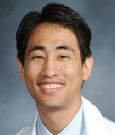Formal discussant Scott T. Tagawa, MD, Associate Professor of Clinical Medicine and Urology at Weill Cornell Medical College, New York, had the task of putting the three prostate cancer trials—PREVAIL, ELM-PC 4, and SWOG S0925—into context.
“Since the approval of docetaxel, we have learned much about the biology of prostate cancer. Multiple new drugs have demonstrated efficacy leading to [U.S. Food and Drug Administration] approval,” he noted.
The PREVAIL trial looked at earlier use of an approved drug, enzalutamide (Xtandi), in the course of disease, while SWOG S0925 evaluated combinations of approved drugs and new targets. The ELM-PC 4 trial looked at a new version of similar drugs.
“PREVAIL was a very positive trial, and enzalutamide is an excellent drug with a high level of efficacy,” Dr. Tagawa said. That said, he urged clinicians to be attentive to the potential grade 3 and 4 adverse events with enzalutamide, including seizures, as well as drug-drug interactions.
The orteronel trial was positive in terms of radiographic progression-free survival benefit in the absence of overall survival benefit for men with minimally symptomatic metastatic castration-resistant prostate cancer. He referenced the ELM-PC 5 trial, which was recently presented at the 2014 Genitourinary Cancers Symposium and was also negative for overall survival.
“Looking at these two large randomized trials of investigational agents in [metastatic castration-resistant prostate cancer], we can confirm antitumor activity of these drugs, but the endpoint of overall survival was negative,” Dr. Tagawa said.
Though there may have been explanations for the negative results based on the availability of other life-prolonging drugs during the conduct of these studies, he questioned the necessity of justifying results of these disappointing clinical trials.
“We now have multiple phase III studies [of agents for metastatic castration-resistant prostate cancer]. We need to know how to use them in an optimal setting such as earlier-stage disease, we need to explore combinations and sequencing of these drugs, and we need to study how to overcome resistance. I urge continued research, collection of specimens, and collaborations with colleagues,” Dr. Tagawa stated. ■
Disclosure: Dr. Tagawa reported no potential conflicts of interest.


